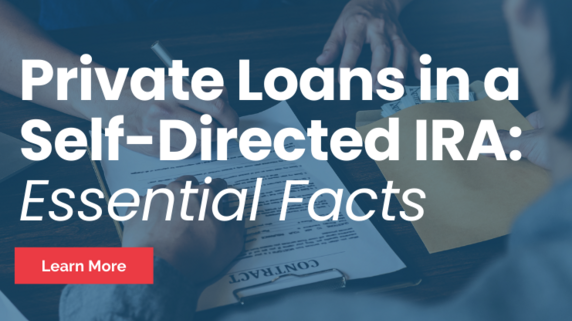Private Loans in a Self-Directed IRA: Essential Facts
The idea of loaning yourself money from an IRA should set off alarm bells: you can’t use “self-dealing” in a Self-Directed IRA, or you could risk losing the protected status of the account. But with Self-Directed IRAs, you can invest in something many people wouldn’t anticipate: private loans to other individuals. As long as those individuals aren’t disqualified persons—such as family or friends—you can make legitimate investments with private loans such as mortgages, secured notes, and even car notes. But how does it all work? Let’s explore private loans in Self-Directed IRAs and what you’ll need to know.
Using Self-Directed IRAs: The Key Factors
Let’s start with what Self-Directed IRAs are. Self-Directed IRAs are versatile retirement vehicles that offer investors a wide array of investment options. You can go beyond traditional choices like public stocks, bonds, and mutual funds. One such option that investors often explore within their Self-Directed IRAs? Yep: private loans. Private loans can be an attractive addition to your retirement portfolio. They can provide steady returns while diversifying your investment holdings.
How does it work? When you invest in private loans through your Self-Directed IRA, you’re essentially acting as the lender. As per the usual loan practice, you’re providing funds to individuals or businesses in exchange for a promised return on investment. These loans can take all sorts of forms, including real estate loans, business loans, or personal loans. And you can choose to engage or not engage in specific types of loans depending on your risk tolerance.
The Benefits of Private Loans in a Self-Directed IRA
There are all sorts of benefits to investing this way. First off, private loans allows you to potentially earn a higher rate of return with some predictability, which isn’t always available in a traditional investment option like stocks. With private loans, you can negotiate favorable terms, too. As long as you find a party who will agree to it, you can negotiate high interest rates and specific repayment schedules. This can be far more profitable than you might imagine.
What’s more, investing in private loans through your Self-Directed IRA can diversify your retirement portfolio. You’re not depending on the stock market so much. By spreading your investments across different asset classes, you get a wider range of risks in your portfolio—and spreading out that risk.
Another advantage of private loans in a Self-Directed IRA is the control you can have over your investments. In the traditional approach to building IRAs, investment options are typically limited to those offered by the brokerage firm. But Self-Directed IRAs empower you to make investment decisions based on your own background or preferences. And maybe you want a more active say in how your portfolio looks.
Self-Directed IRA Loans: Rules and Regulations
It’s not all as easy as pushing a button. You’ll want to be aware of the rules and regulations governing Self-Directed IRAs, including well as any potential tax implications associated with private lending activities. We recommend you work with a custodian of the account, such as American IRA, who can help ensure compliance with IRS guidelines. This will simplify the entire process and give you some additional peace of mind.
Private loans can be a valuable addition to your Self-Directed IRA. They can offer attractive returns and portfolio diversification. And by understanding the risks and benefits associated with private lending, investors can make informed decisions to build a stable long-term retirement portfolio. Interested in learning more about Self-Directed IRAs? Contact American IRA, LLC at 866-7500-IRA (472) for a free consultation. Download our free guides or visit us online at www.AmericanIRA.com.






